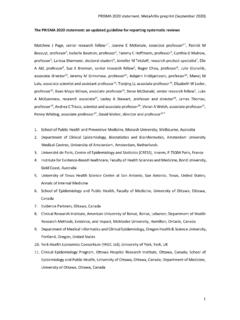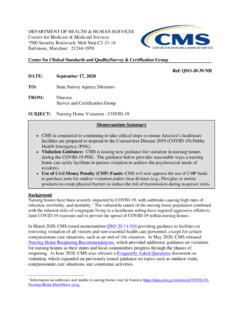Transcription of BSA Statement of Ethical Practice - britsoc.co.uk
1 Of Ethical Practice 2 BSA Statement of Ethical Practice | 2017 This Statement forms part of a set of guidelines which relate to a variety of important aspects of professional british sociological association gratefully acknowledges the use made of the generic ethics principles produced by the Academy of Social Sciences. We also acknowledge the Ethical codes and statements of the Social Research association , the American sociological association , the association of Social Anthropologists of the UK and the Commonwealth, and the british Psychological Statement of Ethical purpose of the Statement is to make both BSA members andother sociologists aware of the Ethical issues that may arise asthey fulfil their varied professional obligations as sociologists andto encourage them to take responsibility throughout for their ownethical Statement does not, therefore, provide a set of recipes forresolving Ethical choices or dilemmas (in the context of potentiallyconflicting interests of the various parties involved), but recognizesthat it may be necessary to make such choices, drawing onfundamental principles (congruent with those set out by AcSS).
2 Work within a wide range of settings (not just inacademic sociology departments, but in a variety of adjacentdisciplinary departments and research centres, with manysociologists also working outside academia). Their role mayencompass the following: Administrative duties within their own institution (such asstaff and student recruitment, management including annualappraisals for line-managed staff members mentoring, policydevelopment, serving on ethics committees, discharging ofresponsibilities involved in REF or equivalent exercises,serving on committees making decision about allocation ofinternal research funding). Sociologists may operate at arange of levels within institutions, including acting as Vice-chancellors, Principals, Deans, and Heads of Department,and members of Senate, Academic Boards, and Boards ofStudy. When engaged in these activities sociologists should beaware of institutional practices , as well as BSA guidelines andshould seek to foster debate where any differences or conflictsare seen to arise between recommended Practice .
3 Professional activities (such as reviewing for funding bodies,serving on grant awarding panels, reviewing for journals,serving on editorial boards as members or editors reviewing for publishers, providing references for jobapplicants, publicizing, fundraising and engaging withpotential sponsors). 2017 BSA PublicationsBSA Publications is a subsidiary of the british sociological association (BSA), registered in England and Wales. Company Number: 01245771. Registered Offices: Bailey Suite, Palatine House, Belmont Business Park, Belmont, Durham, DH1 1TW. VAT Registration Number: every care is taken to provide accurate information, neither the BSA, the Trustees nor the contributors undertake any liability for any error or Statement of Ethical Practice | 2017 Teaching and supervision (of sociology students at any level), including examining at undergraduate and postgraduate levels (within and across institutions), involving acting as external examiner, and validating courses.
4 In some situations the boundary between training, teaching and research can be blurred and sociologists need to consider carefully the Ethical implications of their Practice . Primary research (whether this involves empirical or theoretical engagement) including supervision of more junior staff, providing interim and final reports to funders, conducting of data collection/generation, submitting ethics applications, ensuring secure data storage, archiving of data, disseminating research findings through conference papers, seminars, public events, academic and popular publications, and via the media, including social media). In the field of empirical research, in particular, methodological developments continually raise new issues or constellations of issues that require regular review, perhaps involving updating of guidelines . Hence, these guidelines are supplemented by more detailed statements relating to Ethical conduct in relation to visual sociology , online research and the use of social media (See Digital Research Annexe for further information.
5 Strength of this Statement and its bindingforce rest ultimately on active discussion,reflection, and continued use by addition, the Statement will help to communicatethe professional position of sociologists to others especially those directly involved or affected bythe activities of working group lead by BSA Publications Director Rosaline Barbour undertook the updating of the BSA Statement of Ethical Practice . Their efforts included updating the existing Statement (drafted in 2002 and published in 2004) and the inclusion of a new annexe addressing digital research ethics. Our thanks to this working group:Rosaline Barbour (Trustee), Daniel Conway, Huw Davies, Robert Dingwall, Susan Halford, Christine Hine, Christina Hotz, Wendy Martin, Gabriel Newfield and Lisa Suguira. John Oates also contributed in an advisory capacity. We also thank the authors, anonymous and named, who have contributed case studies on the various aspects of research ethics for strength of this Statement and its binding force rest ultimately on active discussion, reflection, and continued use by sociologists.
6 4 Professional Integrity5. Sociologists have a responsibility both to safeguard the proper interests of those involved in or affected by their work, and to share their analyses/report their findings accurately and truthfully. They need to consider the effects of their involvements and the consequences of their work or its misuse for those they study and other interested parties. Sociologists should note that there are national laws and administrative regulations (for example Data Protection Acts, the Human Rights Act, copyright and libel laws) which may affect the conduct of their research, data distribution and storage, publication, rights of research subjects, of sponsors and employers etc. 6. While recognising that training and skills are necessary for sociological Practice and, particularly for conduct of social research sociologists should themselves recognise the boundaries of their professional competence.
7 They should not accept work of a kind that they are not qualified to carry out. They should be clear about the limits of their detachment from and involvement in their areas of study. (Also see points 43-45) 7. In their relations with the media, sociologists should have regard for the reputation of the discipline and refrain from offering expert commentaries in a form that would appear to give credence to material that, as researchers, they would regard as comprising inadequate or tendentious Research8. Sociologists as researchers should satisfy themselves that the studies they undertake are worthwhile and that the techniques proposed are appropriate. 9. Although sociologists, like other researchers, are committed to the advancement of knowledge, that goal does not, of itself, provide an entitlement to override the rights of others. 10. Social researchers face a range of potential risks to their safety.
8 Safety issues need to be considered in the design and conduct of social research projects and procedures should be adopted to reduce the risk to researchers, including, importantly, any research assistants employed. 11. Sociologists, when they carry out research, enter into personal and moral relationships with those they study, be they individuals, households, social groups or corporate Statement of Ethical Practice | 20175 BSA Statement of Ethical Practice | 2017 Relationships with Research Participants 12. Sociologists have a responsibility to ensure that the physical, social and psychological well-being of research participants is not adversely affected by the research. They should strive to protect the rights of those they study, their interests, sensitivities and privacy, while recognising the difficulty of balancing potentially conflicting interests. 13.
9 Because sociologists study the relatively powerless as well as those more powerful than themselves, research relationships are frequently characterised by disparities of power and status. Despite this, research relationships should be characterised, whenever possible, by trust and Research14. There are serious Ethical and legal issues in the use of covert research but the use of covert methods may be justified in certain circumstances. For example, difficulties arise when research participants change their behaviour because they know they are being studied. Researchers may also face problems when access to spheres of social life is closed to social scientists by powerful or secretive interests. 15. However, covert methods violate the principles of informed consent and may invade the privacy of those being studied. Covert researchers might need to take into account the emerging legal frameworks surrounding the right to privacy.
10 Participant or non-participant observation in non-public spaces or experimental manipulation of research participants without their knowledge should be resorted to only where it is impossible to use other methods to obtain essential data. 16. In such studies it is important to safeguard the anonymity of research participants. Ideally, where informed consent has not been obtained prior to the research, it should be obtained In some cases, where the public interest dictates otherwise and particularly where power is being abused, obligations of trust and protection may weigh less heavily. Nevertheless, these obligations should not be discarded lightly. 18. As far as possible participation in sociological research should be based on the freely given informed consent of those studied. This implies a responsibility on the sociologist to explain in appropriate detail, and in terms meaningful to participants, what the research is about, who is undertaking and financing it, why it is being undertaken, and how it is to be distributed and used.






